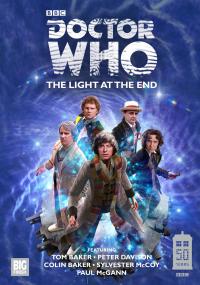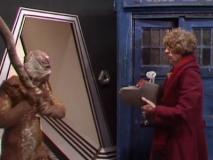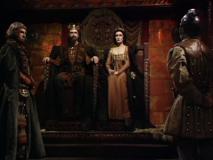
Wide-ranging interviews with cast members of
An Adventure In Space And Time and its writer have been released by the BBC. The 90-minute BBC Two drama, which will air next month, tells how Doctor Who was first brought to the screen, and the interviewees talk in depth about what the production has meant to them.
First off, writer
Mark Gatiss, who describes it as "a love-letter to Doctor Who" and says why he had to condense things:
What can viewers expect from the drama?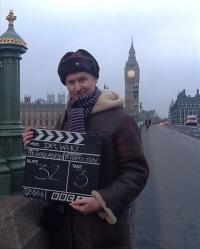
Principally, it's the story of how Doctor Who was created, so we concentrate on the very beginnings and the first few episodes. There are lots of treats for the fans but it's also the story of William Hartnell, the First Doctor, and how the part transformed his life.
Why did you want to tell this story?I'm a life-long Doctor Who fan and the origins of this beloved show have always fascinated me. But, above all, I wanted it to strike a chord on a human level. These were brilliant, complex, talented people making something revolutionary. And, in William Hartnell, we have the very affecting story of a man redeemed by the role of a lifetime who then, sadly, had to let it go. I think we can all relate to something like that in our lives.
What was the casting process like? Did you set out to find such good lookalikes?I'd had David Bradley in mind for some years but it wasn't simply a question of a good likeness! David is such a fine and delicate actor, I knew he'd find something wonderful in the part. With everyone else, I stressed that we must first and foremost get the right people for the job. But it turned out the right people also bear the most amazing resemblances to the originals! Costume and make-up, of course, played a huge part in that.
Could you explain a little bit about the research process?Doctor Who is probably unique in terms of TV shows in that its history has been exhaustively researched for years. Happily, this means that there are lots of interviews existing with people who are no longer with us. I'd wanted to tell the story for years – I sort of grew up with it. How no-one wanted the Daleks. About the first episode going out just after JFK was shot. But I wanted to get deeper than just the details of production and find the human story. I conducted new interviews with a lot of the original cast and crew. They were all hugely enthusiastic and very helpful.
Did you uncover any facts or information that you didn't previously know as a Doctor Who fan?A few bits and bobs but, as I say, most of it is very well documented now! It was very touching, though, to talk to people about a part of their lives that was often very happy and to discuss people long gone.
There were so many people involved in the show's beginnings, why did you decide to focus on the four central characters of Hartnell, [Sydney] Newman, [Verity] Lambert, and [Waris] Hussein?I had to focus it down. Simple as that. This is a drama, not a documentary, and though it's extremely painful to have to leave out some people who played a huge part, it makes dramatic sense. You simply can't do everyone justice in 90 minutes. For instance, the story of how Terry Nation and Ray Cusick created the Daleks is almost a film all on its own! Jeff Rawle plays Mervyn Pinfield, who was the associate producer, and his character sort of absorbs several others including Donald Wilson and the brilliant David Whitaker – the first script editor - whose contribution was immeasurable.
Set in the 1960s the drama brings to life that era through the costumes, hair and make-up and the sets, including the first-ever TARDIS console. What was it like being on set?It was extraordinary. To see the original TARDIS re-created genuinely took my breath away and everyone who came to the set had the same reaction. It was frequently quite uncanny. We used some of the original Marconi cameras and, on the black-and-white monitors, seeing David, Jemma [Powell, as Jacqueline Hill], Jamie [Glover as William Russell], and Claudia [Grant as Carole Ann Ford] was like looking back through time. Spooky and very moving.
Finally, what do you hope audiences take away from the drama?This is my love-letter to Doctor Who! In this 50th-anniversary year, I hope fans will enjoy and be thrilled by it and all the kisses to the past it's laden with. But my greatest wish is that it appeals to people who know very little or nothing about Doctor Who and see the struggle of talented people (almost) accidentally creating a legend!
David Bradley talks here about portraying William Hartnell - an actor he greatly admired - and transforming himself into the Doctor:
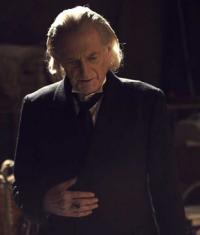
A popular screen star, well regarded by his peers, William Hartnell appeared in numerous plays, films, and TV shows, often playing the "tough guy" role as typified by his character Sgt Major Percy Bullimore in the Granada-made comedy The Army Game, which ran on ITV for five series between 1957 and 1961, three of which - series 1, 2, and 5 - featured Hartnell.
When he was first approached, Hartnell was widely reported to have been unconvinced by the role of Doctor.
"It has to be said, after some initial reluctance to do something for children's TV I think he was quickly convinced that it was the right thing for him to do," says David. "He felt quite insecure about it as it was new territory for him, but once he started he embraced the whole idea of the part."
An Adventure In Space And Time tells the story behind the beginnings of Doctor Who and the team of personalities behind it. Known as a perfectionist, Hartnell was widely regarded as cantankerous by colleagues. But as David explains, the script for 'Space And Time' reveals a full picture of Bill, including the good and the bad.
"I know he had a reputation at times for being cantankerous and rather difficult and one has to play that. It was clear from research and hearing his colleagues talk about him that he was a perfectionist. He demanded a lot of himself and he expected everyone around him to show the same level of commitment."
Hartnell played the role from 1963 until 1966, creating the template for the character of the Doctor, which has since been played by 10 other actors on TV. And he embraced all that embodied the show, as David explains: "He was invited to school fetes in the full outfit and I thought how brilliant and touching that was. It's clear that he absolutely loved it and found it very hard to let go. That's an element that Mark Gatiss brings out in the script."
Deteriorating health led Hartnell to finally retire from the role, but as his illness worsened, so too did his relationship with the production team of Doctor Who.
"I think maybe when people joined the show later, different directors and different actors, if they showed a lack of commitment then it would upset him and he would let people know that's how he felt," says David. "There are moments of sadness in 'Space And Time' where he becomes aware that he hasn't got the strength to do it any more."
David grew up with the show ("I remember Hartnell, Troughton and Pertwee best") and last year starred opposite current Doctor Matt Smith [in Dinosaurs On A Spaceship, as the villain Solomon]. Does he see any of Hartnell's characteristics in Smith?
"I really admire him as a Doctor. He's got that curiosity and that slight eccentricity that the part requires, not in the same way as Bill Hartnell, but I think some of those characteristics have gone all the way through everyone that's played the Doctor."
So how would David sum up his experience taking on one of TV's most iconic roles?
"It's been one of those great jobs and an experience I'll always remember. We're honouring something that's been part of television history for 50 years and I hope I've done justice to an actor that I admire greatly."
takes on the role of Verity Lambert, the first female drama producer at the BBC and the first-ever producer of Doctor Who. She explains what it was like stepping into the shoes of such a formidable woman, and the importance of making sure they showed the fun side of Verity:

"She was very strong-willed, very compassionate and very warm," Jessica says enthusiastically about Verity.
"As the first female drama producer at the BBC she had to be very determined. She had a real fire in her belly about projects she believed in."
Verity Lambert began her career at the BBC in June 1963, having followed ABC's former head of drama, Sydney Newman, to the corporation. Lambert oversaw the first two seasons of Doctor Who, eventually leaving in 1965. It has since become the project she is most famed for.
In An Adventure In Space And Time, one of our first introductions to Verity is at a Swinging Sixties house party, which, according to Jessica, shows the lesser-known fun side of the producer.
"We concentrate more on her work, but we do get a little sliver of the fun side of Verity," says Jessica. "Apparently she used to hold these art parties and invite the artist and all of her mates around and have a sort of exhibition, a bit of music, and a bit of dancing."
Well-known among Doctor Who fans, Sydney Newman once described her as full of "piss and vinegar" and claimed that hiring her was one of the best things he ever did. So, what research did Jessica do to prepare for the role?
"For any role I pretty much always go to the script, first and foremost. While I was auditioning I did look for video clips, but they were all from recent years, but it was interesting to see her. I felt she was very composed, very classy, very warm, but you could see real steel there.
"I also watched the original episode that Verity, Waris, and Sydney, to a certain extent, created and I was really struck by how it holds its own. It's eerie, weird, intriguing, and it's incredible that they were able to do that on such a minuscule budget."
Playing such a formidable character, does Jessica see any similarities between herself and Verity?
"I guess I didn't quite realise how determined I was to act, I really did plug away for it for a while, so I suppose I am in a way. I like that Verity's got quite a twinkle in her eye. It would be very flattering if anyone compared me to her."
Telling the story of the genesis of Doctor Who and the many personalities involved, An Adventure In Space And Time sums up a moment in television history and the start of the world's longest-running science-fiction series.
"I think it encapsulates a time in the Sixties when we're on the brink of this huge change - and it does it really subtly," explains Jessica. "We've got Verity Lambert walking into the BBC, who is a woman. We've got Waris Hussein, the first Indian director at the BBC. The stakes are very high and that reflects what was going on in society at the time."
Apart from reflecting the societal changes at the time, the drama also explores the origins of one of the world's most recognisable monsters, the Daleks.
"I actually do remember being really afraid of the Daleks," says Jessica. "I was just terrified of their horrible voice, which I always equated with the voice on the Tube. We used to go up to London, because I was from the countryside, for a London weekend and the Tube voice, 'Mind the gap', used to always remind me of the Daleks, so it was just a terrifying experience!"
Playing BBC head of drama Sydney Newman,
Brian Cox talks about working at Television Centre in the 1960s and the colourful force of nature that was Newman, who joined the BBC in 1962 after a successful stint at commercial channel ABC. Newman's love of science fiction soon led to the creation of Doctor Who as the corporation looked to find a programme to fill a 25-minute teatime slot on Saturdays.
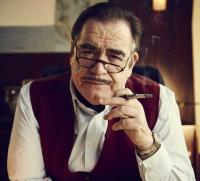
"Sydney Newman was a formidable force in television," says Brian. "He started at ABC and kind of revolutionised drama. I first worked at the BBC in 1965 and did my first-ever television play, 'A Knight In Tarnished Armour', and Sydney was there and I actually met him very briefly. You could always spot Sydney in the BBC Club because of his brightly-coloured cravats and waistcoats. And his personality was the same!"
We first meet Newman in An Adventure In Space And Time as he strides into Television Centre, ignoring the security guard's calls to show his pass, and walking away with "That’s not how we do it at the BBC, sir" ringing in his ears.
But as Brian explains, Sydney was very different to others at the corporation.
"The BBC was very stuffy. There were very good producers and directors, but it was all done by the board and delegation committee, and lots of memos. Sydney had a very different approach, a hands-on approach, and I think that's what made him unique. He brought a breath of fresh air."
As well as being very passionate about his projects, Newman also had a knack for spotting a hit and delegating. He trusted those he appointed to do the work and gave them second chances. This is evident in 'Space And Time', which reveals that despite rumblings of criticisms about producer Verity Lambert's overspending and hating the first try at the first episode of Doctor Who, he gave his team another shot.
"He had them reshoot the whole of the first episode of Doctor Who because he didn't think it was quite right," explains Brian. "I think he was very revolutionary. I think he really did create a standard."
Trying to find a teatime family show, Newman was clear there should be no "bug-eyed monsters", and he hated the idea of the Daleks, but as we see in 'Space And Time', on seeing their success he was happy to admit he was wrong.
"Ultimately, he was a populist," says Brian. "He believed in making drama popular. I think he took forward the original Director-General Lord Reith's philosophy in wanting to get the best possible drama to the maximum number of people."
So does Brian see any similarities with Newman?
"I think there's something very positive about Sydney and he was a force going against the norm of the day. In a sense, I'm very empathetic to him; he’s very much my kind of guy."
plays the role of the director of the first episodes of Doctor Who, Waris Hussein. Here, he talks about how
An Adventure In Space And Time deals with the challenges Waris faced as the first Indian-born drama director at the BBC and using music from the Sixties to get his swagger. A graduate of Cambridge, Hussein was faced with a number of tests when he joined the BBC and, like Hartnell, was not particularly enthused by the idea of directing a show for children.
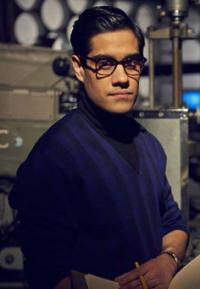
"There were definitely challenges for Waris at the time, but I think in the longer term it made him a better director," says Sacha. "And I think Doctor Who was one of those projects that gave him immense confidence."
Following on from Doctor Who, Hussein went on to have a long career directing a variety of projects from A Passage To India to Shoulder To Shoulder.
As well as touching on the issues of being an Indian director at the BBC in the 1960s, the drama explores the bond between Hussein and the producer Verity Lambert. They struck up a strong friendship and became a committed team, with Hussein going on to work with Lambert on several other productions after Doctor Who.
To research the role, Sacha spent a lot of time with Waris, first meeting him at a public screening of the episodes he directed.
"He is quite a specific character and I wanted to make sure that I played him as truthfully as possible," explains Sacha. "He has a particular way of speaking as well, which I really wanted to home in on."
"We were a bit kind of weird with each other; we were both studying, looking at one another. He was looking at me thinking 'You're watching everything I'm doing, aren't you?', but we hit it off straight away," he says.
Hussein attended one of the first scenes Sacha filmed, showing Lambert and Hussein in the BBC Club. "He started welling up and getting quite moved by it," says Sacha. "I hope that was in a good way and not a bad one, but I think he seemed happy."
Sacha was excited to tackle a period setting he'd never done before. "When I first read the script, it was the era that really excited me. I'd never done anything in this kind of genre. The 1960s is so cool; I love the set and the clothes. As soon as you wear them, you act in a certain way; you walk in a different way."
And to get in to the right frame of mind Sacha dipped into his music collection. "I listened to loads of Sixties music on the way to work, to get a certain kind of swagger."
So how would he sum up 'Space And Time'?
"I think it appeals to those who aren't necessarily Doctor Who fans. I was very moved by the script, particularly William Hartnell's journey, which I relate to as an actor myself," he concludes.
 A video of the main guest panel for the BFI's Eighth Doctor celebratory event was uploaded for viewing this morning.
A video of the main guest panel for the BFI's Eighth Doctor celebratory event was uploaded for viewing this morning.
 Wide-ranging interviews with cast members of
Wide-ranging interviews with cast members of  Principally, it's the story of how Doctor Who was created, so we concentrate on the very beginnings and the first few episodes. There are lots of treats for the fans but it's also the story of William Hartnell, the First Doctor, and how the part transformed his life.
Principally, it's the story of how Doctor Who was created, so we concentrate on the very beginnings and the first few episodes. There are lots of treats for the fans but it's also the story of William Hartnell, the First Doctor, and how the part transformed his life. A popular screen star, well regarded by his peers, William Hartnell appeared in numerous plays, films, and TV shows, often playing the "tough guy" role as typified by his character Sgt Major Percy Bullimore in the Granada-made comedy The Army Game, which ran on ITV for five series between 1957 and 1961, three of which - series 1, 2, and 5 - featured Hartnell.
A popular screen star, well regarded by his peers, William Hartnell appeared in numerous plays, films, and TV shows, often playing the "tough guy" role as typified by his character Sgt Major Percy Bullimore in the Granada-made comedy The Army Game, which ran on ITV for five series between 1957 and 1961, three of which - series 1, 2, and 5 - featured Hartnell. "She was very strong-willed, very compassionate and very warm," Jessica says enthusiastically about Verity.
"She was very strong-willed, very compassionate and very warm," Jessica says enthusiastically about Verity. "Sydney Newman was a formidable force in television," says Brian. "He started at ABC and kind of revolutionised drama. I first worked at the BBC in 1965 and did my first-ever television play, 'A Knight In Tarnished Armour', and Sydney was there and I actually met him very briefly. You could always spot Sydney in the BBC Club because of his brightly-coloured cravats and waistcoats. And his personality was the same!"
"Sydney Newman was a formidable force in television," says Brian. "He started at ABC and kind of revolutionised drama. I first worked at the BBC in 1965 and did my first-ever television play, 'A Knight In Tarnished Armour', and Sydney was there and I actually met him very briefly. You could always spot Sydney in the BBC Club because of his brightly-coloured cravats and waistcoats. And his personality was the same!" "There were definitely challenges for Waris at the time, but I think in the longer term it made him a better director," says Sacha. "And I think Doctor Who was one of those projects that gave him immense confidence."
"There were definitely challenges for Waris at the time, but I think in the longer term it made him a better director," says Sacha. "And I think Doctor Who was one of those projects that gave him immense confidence."


 Australian broadcaster ABC has confirmed it will screen the drama based on the origins of Doctor Who, An Adventure in Space and Time, on Sunday 24th November.
Australian broadcaster ABC has confirmed it will screen the drama based on the origins of Doctor Who, An Adventure in Space and Time, on Sunday 24th November. 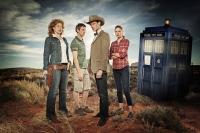
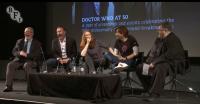

 Part twenty-seven in our series telling the story of the creation of Doctor Who, and the people who made it happen.
Part twenty-seven in our series telling the story of the creation of Doctor Who, and the people who made it happen.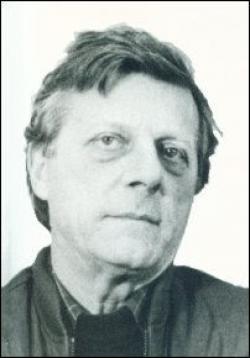 This would include creatures called the Daleks - Doctor Who's first race of alien monsters. On Sunday 27th October 1963, exactly fifty years ago today, draughtsman A. Webb drew up the earliest surviving formal designs for the Daleks, from the plans of designer
This would include creatures called the Daleks - Doctor Who's first race of alien monsters. On Sunday 27th October 1963, exactly fifty years ago today, draughtsman A. Webb drew up the earliest surviving formal designs for the Daleks, from the plans of designer 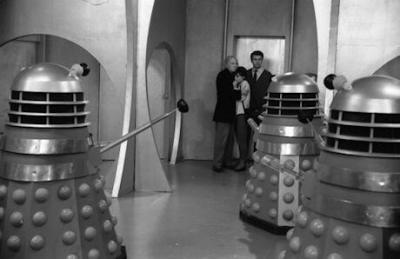 Cusick worked throughout October on refining the design, consulting with other experts in the field such as
Cusick worked throughout October on refining the design, consulting with other experts in the field such as 


